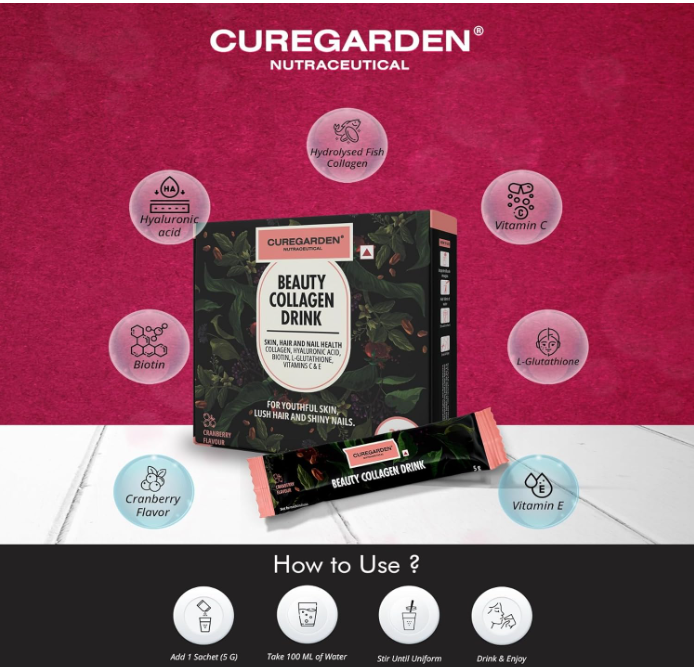Essential Takeaways
What Are Collagen Supplements?
Collagen is a type of protein that makes up about one-third of the protein in your body. It acts like the body’s scaffolding, giving structure to skin, bones, tendons and cartilage. Our bodies naturally build collagen from the amino acids we get in food, but production drops off with age (starting as early as our 20s). Collagen supplements are not “whole” collagen, but small collagen peptides (short amino acid chains) that are easier to absorb. They usually come as powders or pills, often derived from animal sources like fish, beef, poultry or pork.
Why do people take them? The idea is that these extra peptides provide building blocks for your body’s own collagen. In other words, these supplements supply protein and amino acids (like glycine and proline) which your body can use. In fact, studies show collagen supplements increase blood markers of collagen production, especially in older adults. With so many options on store shelves, it helps to understand their benefits and risks.
Benefits of Collagen Supplements
Collagen supplements promise many benefits. What does the research say? Early studies and reviews suggest modest improvements in several areas:
Skin health: Daily collagen peptides have been shown to improve skin elasticity, hydration and firmness. A review of 19 trials found users had firmer, more supple skin with fewer visible wrinkles. Another meta-analysis reported increased skin elasticity and density after 60–90 days, with wrinkles getting shallower. These effects are often more noticeable in older adults. However, experts note that many supplements mix collagen with other ingredients (like vitamins or hyaluronic acid), so it’s hard to know if collagen alone caused the changes.
Joints and bones: Collagen is a major component of cartilage, the tissue that cushions joints. Some studies suggest these supplements may ease joint pain and support bone health. For example, older people taking collagen reported less knee pain from osteoarthritis, and imaging showed increased cartilage volume in some trials. Bone density may also improve; one study found even a low dose (5 g/day) increased spine and hip bone density over a year. Overall, evidence is growing that collagen can help with joint comfort and maintain bone strength, though results vary by person.
Muscles: Several trials combined collagen supplements with resistance exercise. They found that taking about 15 g of collagen per day led to significant gains in lean muscle mass and strength, especially in active or older adults. The extra collagen provides amino acids needed to build muscle and connective tissue. (To build muscle well, it’s still important to eat a full protein diet, but adding collagen may give a specific boost of certain amino acids like glycine and proline.)
Hair & nails: Many marketing claims say collagen improves hair growth and nail strength. In reality, solid evidence is lacking. One small study (25 people) found collagen reduced nail brittleness, but it had no placebo group for comparison. There are essentially no human trials showing faster hair growth or thicker hair from collagen. Experts warn that any improvements in hair or nails from collagen supplements are mostly anecdotal.
Gut health: Emerging research hints that collagen peptides may benefit the gut. Collagen supports the intestinal lining and can act as a food source for healthy gut bacteria. Some early studies suggest collagen supplements can improve digestion and reduce mild bloating. This is still a new area of research, but many feel collagen helps “heal” the gut lining and improve digestive comfort.
It’s important to ask: Are collagen supplements a magic bullet? Not quite. Benefits tend to be modest and often depend on taking supplements consistently (usually for at least 2–3 months). Placebo effects (expecting improvement) can also play a role. Still, most experts agree that if combined with a healthy diet and exercise, collagen supplements may support skin, joint and muscle health.
Are Collagen Supplements Safe?
For most people, yes – they are generally considered low-risk. Clinical studies report that collagen supplements are well-tolerated with few side effects. Mild stomach upset or nausea is rare, and allergic reactions are unusual but possible. If you have allergies to certain animals, avoid those sources (for example, people with fish or shellfish allergies should skip marine collagen).
That said, there are a few safety notes: Collagen is often extracted from animal parts (skin, bone, cartilage). As with all animal-derived products, there is a potential for contaminants. Some collagen from bone or shellfish can contain heavy metals or prions. One expert warns that bone-derived collagen can have high levels of metals, whereas collagen from skin or fish tends to be cleaner. The bottom line: quality matters.
Regulation is another issue. In the U.S., these supplements are sold as dietary supplements. They do not need FDA approval before going on the market. Manufacturers are supposed to ensure safety, but because oversight is limited, the purity and ingredient list can vary. For example, an FDA notice in 2024 clarified labeling rules for collagen products, underscoring that companies must follow dietary supplement regulations.
Some people should be cautious or check with a doctor before using these supplements. If you have gout or kidney issues, high protein intake (from collagen) could be a problem. Also, there is no research on safety in pregnancy or breastfeeding, so most sources advise against taking collagen during those times.
In summary, collagen supplements are not inherently dangerous, but you should pick a high-quality product. Look for third-party tested brands to avoid toxins and heavy metals. MD Anderson experts recommend choosing products tested by labs (NSF, USP, etc.) to ensure they’re free from contaminants. If a supplement is cheap or from an unknown source, it’s wise to be skeptical. Remember, supplements aren’t tightly regulated, so trust in brand reputation and testing.
How to Choose the Right Collagen Supplement
With so many collagen products out there, how do you pick the best one for you? Here are some expert tips:
Opt for hydrolyzed collagen (collagen peptides): This form is broken into small peptides, which are easier for your body to absorb. Most research on collagen benefits has used hydrolyzed collagen powder or capsules.
Check the source: Collagen often comes from bovine (cow), porcine (pig), chicken or marine (fish) sources. Marine collagen peptides usually have lower molecular weight and may absorb more easily. Grass-fed, pasture-raised bovine collagen and wild-caught marine collagen tend to have fewer additives or contaminants. Avoid gelatin from unknown bones, which can carry more heavy metals.
Look for third-party testing and certifications: Choose products verified by independent labs. Seals from NSF International, USP, ConsumerLab or similar groups ensure the product contains what it claims, with no hidden toxins or heavy metals. This is one of the best ways to avoid poor-quality or counterfeit collagen on the market.
Check ingredients: Read the label. Avoid collagen supplements with a lot of extra fillers, sugars, artificial flavors or sweeteners. Pure collagen powders usually dissolve clear and have little taste or smell. Some brands add vitamin C, hyaluronic acid or other nutrients, which may help with absorption and skin health, but avoid unnecessary extras.
Match the type to your goals: If you’re targeting joint health, some supplements contain type II collagen (from chicken cartilage) or extra glucosamine. For skin and beauty, type I and III (from fish or bovine) are most common. However, the evidence is stronger that all collagen types provide similar amino acids once absorbed. Choose a well-reviewed product in the category you want.
Mind dietary needs: If you follow a special diet or have allergies, pick accordingly. For example, marine collagen is fish-based and not suitable if you avoid seafood. There is no true “vegan collagen” (collagen comes from animals), but plant-based supplements may contain nutrients (like vitamin C and amino acids) that support your own collagen production.
Follow recommended dosages: Most studies use around 5–15 grams of collagen per day. The Hackensack expert advises 2.5–10 g daily for skin and joint benefits. Starting with a lower dose and following the label is wise. It’s generally safe up to 15 g/day, but more is not necessarily better.
Choosing the right collagen supplement can be personal. Check reviews, company transparency (many brands share lab results), and value (more expensive doesn’t always mean better, but very cheap is a red flag). If possible, discuss with a healthcare provider, especially if you have health conditions.
Remember: collagen supplements can complement a healthy lifestyle – but they’re not a substitute for one. Protect your skin with sunscreen, eat a protein-rich diet, stay active, and drink water. These can be a helpful addition, but they work best when you also have good diet and exercise habits.
Bottom Line
Collagen supplements are a popular way to support skin, joint and muscle health. Research shows some benefits (skin elasticity, joint comfort, muscle recovery) when taken consistently. They are generally safe for most people, but quality and purity vary between products. To choose a supplement, look for hydrolyzed collagen from a trusted source, third-party testing, and minimal additives. Like any supplement, collagen works best as part of an overall healthy lifestyle.
Frequently Asked Questions
1. What are collagen supplements used for?
Collagen supplements are used to support skin elasticity, joint comfort, bone strength, and muscle recovery. They help boost your body’s natural collagen production, which declines with age.
2. Do collagen supplements really work?
Yes, research shows that collagen supplements can improve skin firmness, hydration, and reduce wrinkles. They may also help reduce joint pain and support muscle recovery when taken regularly.
3. How long does it take to see results from collagen supplements?
Most people notice visible improvements in 6–12 weeks. Skin elasticity, hydration, and joint comfort typically improve after consistent daily use for at least two months.
4. Are collagen supplements safe to take every day?
Yes, collagen supplements are generally safe for daily use. Mild digestive discomfort can occur in rare cases. Always choose high-quality, third-party tested products and consult your doctor if you have health conditions.
5. What is the best form of collagen supplement?
Hydrolyzed collagen (also called collagen peptides) is the best form since it’s easily absorbed by the body. Marine or bovine sources are commonly preferred for skin and joint health.
6. Can vegetarians or vegans take collagen supplements?
Traditional collagen comes from animal sources. However, vegans can opt for plant-based collagen boosters made with vitamin C, amino acids, and nutrients that naturally support collagen production.
7. When is the best time to take collagen supplements?
You can take collagen anytime, but many prefer it in the morning with coffee or smoothies, or post-workout for muscle recovery. Consistency is more important than timing.
8. Do collagen supplements help with hair and nail growth?
Some studies suggest collagen may strengthen nails and reduce brittleness, though evidence for hair growth is limited. A balanced diet and good protein intake are equally important.
9. Can collagen supplements cause any side effects?
Collagen is well-tolerated by most users. Rarely, people experience mild bloating or an aftertaste. Those with fish or shellfish allergies should avoid marine collagen products.
10. How do I choose the right collagen supplement?
Pick a hydrolyzed collagen supplement from a trusted, third-party tested brand. Look for minimal additives, clear sourcing (marine or bovine), and clinically tested purity and potency.









